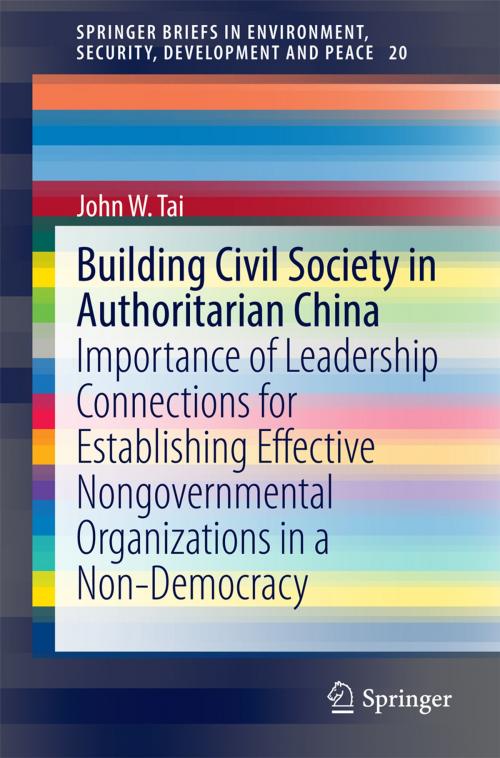Building Civil Society in Authoritarian China
Importance of Leadership Connections for Establishing Effective Nongovernmental Organizations in a Non-Democracy
Nonfiction, Reference & Language, Law, Environmental, Social & Cultural Studies, Social Science, Sociology| Author: | John W. Tai | ISBN: | 9783319036656 |
| Publisher: | Springer International Publishing | Publication: | August 28, 2014 |
| Imprint: | Springer | Language: | English |
| Author: | John W. Tai |
| ISBN: | 9783319036656 |
| Publisher: | Springer International Publishing |
| Publication: | August 28, 2014 |
| Imprint: | Springer |
| Language: | English |
How is modern civil society created? There are few contemporary studies on this important question and when it is addressed, scholars tend to emphasize the institutional environment that facilitates a modern civil society. However, there is a need for a new perspective on this issue. Contemporary China, where a modern civil society remains in a nascent stage, offers a valuable site to seek new answers. Through a comparative analysis of nongovernmental organizations (NGOs) in today’s China, this study shows the importance of the human factor, notably the NGO leadership, in the establishment of a modern civil society. In particular, in recognition of the social nature of NGOs, this study engages in a comparative examination of Chinese NGO leaders’ state linkage, media connections and international ties in order to better understand how each factor contributes to effective NGOs.
How is modern civil society created? There are few contemporary studies on this important question and when it is addressed, scholars tend to emphasize the institutional environment that facilitates a modern civil society. However, there is a need for a new perspective on this issue. Contemporary China, where a modern civil society remains in a nascent stage, offers a valuable site to seek new answers. Through a comparative analysis of nongovernmental organizations (NGOs) in today’s China, this study shows the importance of the human factor, notably the NGO leadership, in the establishment of a modern civil society. In particular, in recognition of the social nature of NGOs, this study engages in a comparative examination of Chinese NGO leaders’ state linkage, media connections and international ties in order to better understand how each factor contributes to effective NGOs.















